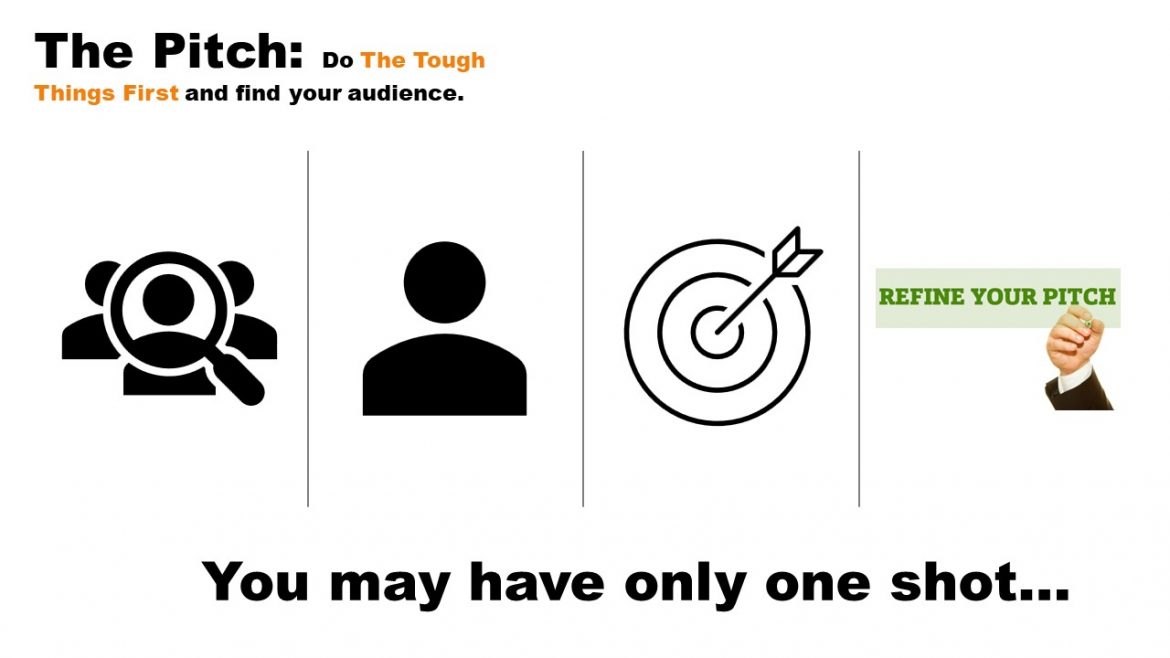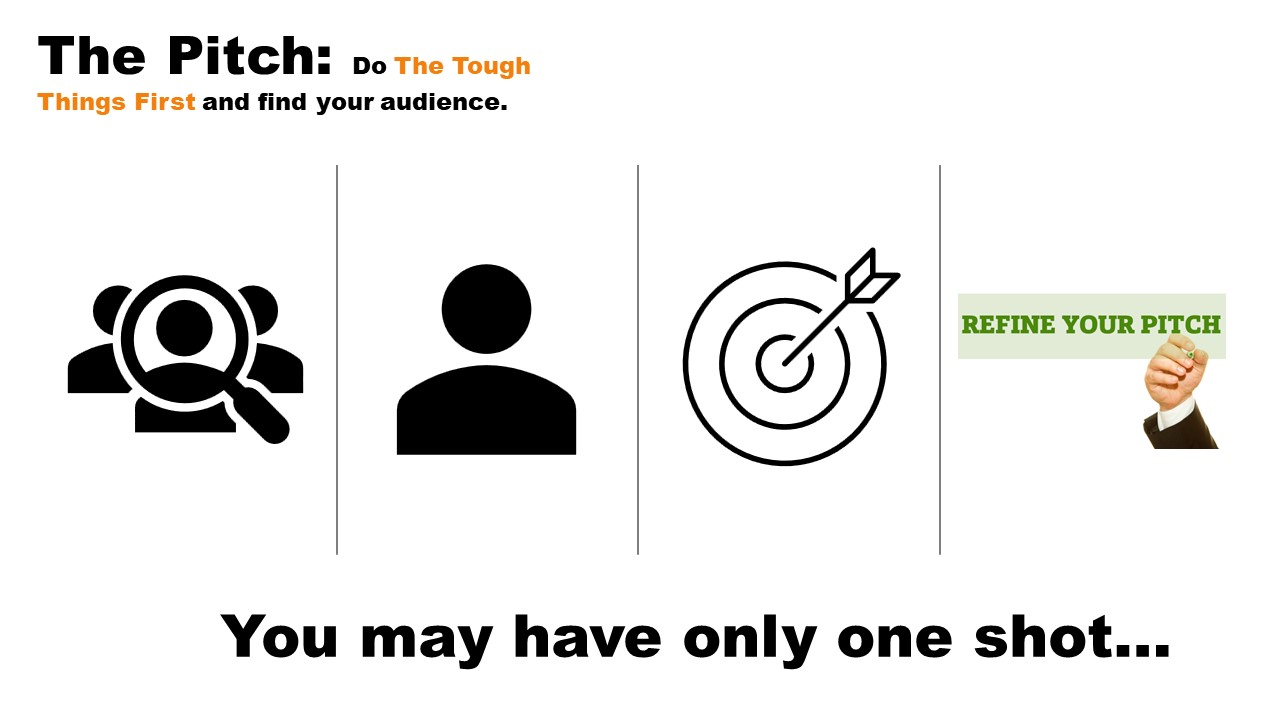
No matter how dialed-in, intriguing, and dynamic, your startup pitch is, if you try to sell hamburgers to an aardvark, you’re just wasting the aardvarks time. In this Tough Things First podcast, Ray Zinn talks about why choosing your audience carefully earns respect and results in success.
Rob Artigo: I’m Rob Artigo, your guest host for this edition of the Tough Things First Podcast where I get a chance to talk with Ray Zinn, as noted there, the longest serving CEO in Silicon Valley, and that’s for a good reason. Hi Ray, it’s good to be back with you.
Ray Zinn: Hey Rob, so good to be with you again.
Rob Artigo: Well, Ray, we’ve talked a lot about pitching on this show, we’ve mentioned Shark Tank. We’ve gone in depth in different aspects of pitching, but one thing that we haven’t talked about really is the idea of choosing your audience. And I imagine that the best way to describe this to people is to picture the panel at Shark Tank, and each one of those people. When you go out there, the way they’ve got that show designed is there are some crossover between what each one of them can do to a certain extent. But are they willing to, do they want to? That’s a whole different story. But you have people who actually just deal in fashion, deal in home shopping network, deal in different kinds of technology, that kind of thing.
Ray Zinn: If you look at the Shark Tank panel, you’ve got Barbara, who’s real estate. Well, they switch off, they bring on guests from different areas. But you have Lori who’s a multimedia, she sells through multimedia. You have Kevin who’s more of a wine connoisseur, or banking, or he likes to do the ones where there’s a way to do the licensing. He likes that, and so if there’s a licensing opportunity. And then there’s Rob, I think, who’s a technical guy, he is a software type, and so is Mark Cuban. So Mark, he’s more of a software guy. He had a big software company and he’s more of a big market. He’s a marketing guy, so they have a cross section. So that’s a little different group than you would have if you went down on Page Mill Road in Silicon Valley, they all have specialties, and of course Silicon Valley is more technical. So if you want to start up a food connoisseur company, you wouldn’t go to Page Mill Road.
So you have to make sure you pitch your idea, your concept, your mission, to a group that has some expertise there, whether it be real estate or multimedia marketing, or real estate, or whatever. Make sure that you pick people who have some idea of the market that you’re trying to penetrate. So you’re already have to the right audience. Obviously it’s like when we write books, you and I have written these books and pitched them to different publishers, we had to make sure that that book fit the market that they focus on. Unless you go to one of the big five or publishers, most of these publishing companies have specialties, religion, fiction, business, so forth. So you just want to make sure that you’re pitching your product idea to the right publisher or market.
Rob Artigo: That’s a great example because whatever your business is, you’re selling it to somebody else. You’re selling the idea to somebody. You’re selling the hope and aspirations, the plan for this company. “This is what I’m going to do, this is what I’m selling, this is how I’m going to make money.” You have your whole concept to layout before them, hopefully quickly. But if at the end of the thing you’ve talked so fast that the person sits there and says, “I really think this is an interesting idea, but it’s not for me because I’m not in that area,” you’ve really shot yourself in the foot.
Ray Zinn: You hear that on Shark Tank all the time. “I don’t have any experience in this area,” or, “I don’t like that product,” or, “That’s not for me,” or whatever. Or, “I’ve already got a company that’s already in that market, and so I feel like it’s a conflict of interest.” The saying about selling refrigerators to Eskimos, I’ve heard that since I’ve been a child.
Rob Artigo: Sure.
Ray Zinn: And that’s a euphemism for saying you’re trying to sell something to somebody who doesn’t need it. And so if you’re going go on Shark Tank and pitch your idea on Shark Tank or your business, you know the group that’s sitting there already. You know there’s five or six of them, and so you’re going to gear your pitch to that one person. You’re not going to pitch a non-marketing idea, multimedia idea to Barbara or something because her expertise is real estate. And so, same thing with Kevin. If it doesn’t have a licensing opportunity, don’t gear it toward that toward Kevin. And so it just goes right down the line of they have the five or six people on Shark Tank and you know that going in. You know when you’ve been assigned to be on that program, you got to make sure your pitch is suitable for one or two or how many that may want to invest in your product idea. So anyway.
Rob Artigo: You may also also find that in the process of getting out there and pitching your ideas that you find some people are in your area but they don’t like certain aspects of what your plan is, so that you are, I don’t know, maybe you’ve got a goblin widget that is involved in the process that they would be competing against in a certain way. And they’re like, because of that one aspect, it’s like you can’t remove it from your plan, but it’s like a boogeyman in their idea, like we can’t go into that field. You know what I mean? You could run into that kind of stuff.
Ray Zinn: That happens all the time.
Rob Artigo: Yeah.
Ray Zinn: Again, depends upon where you’re going to be pitching it. If you’re going to pitch it on Page Mill Road in Palo Alto in Silicon Valley, then you make sure that your audience there has the expertise in the area in which you’re trying to raise money. And if you’re going to pitch it on Shark Tank or Shark Tank type, we have a panel of six people with six different areas of expertise. Make sure that your product idea or your mission is geared toward one or more of that panel. If your idea does not fit to one or more of those individuals, don’t do it. Now, on Shark Tank, that’s a TV program. So you may have a product that doesn’t match any of the ones that are sitting there, but because it’s funnier, because it has some kind of an appeal to the TV audience, they’ll still let you come on and pitch it. But that’s not real life. That’s TV.
Rob Artigo: Yeah.
Ray Zinn: Okay?
Rob Artigo: Yeah.
Ray Zinn: So unless you’re doing a Shark Tank, the proposal, your product idea has to be appealing to the investment group that you’re going after, whether it be an Angel Fund or whether it be another more mature, well-known like Sequoia Capital, you should know what they invest in. You can go online. Every one of those investment firms has a website. You can go on there, look at the kind of companies they invest in, and you ask yourself, “Do they have or have they invested in markets that match mine?” The one you want to go into.
So the purpose of this podcast is to make sure that your target audience and the investment audience has an appetite for the idea or product that you’re going to propose. And then when you get ready to pitch it, make sure that you have all the Is dotted and the Ts crossed and that they will not look skeptical on your proposal. And by the way, they’re going to, I guarantee you, they’re looking for the negatives. They look more at the negative than do the positives. And you need to know that. You need to know, okay, where are the limitations of my proposal? And then you focus on that so that you’re ready to overcome those objections.
Rob Artigo: And I think that it is an easier, it’s time-consuming, but it’s an easier thing to do than some entrepreneurs may think, and then they worry about it or get wrapped around the axle about it and then don’t do it, which is just data-mining the internet. You find somebody go, “Okay, I’m going to have a chance to talk to so-and-so.” Find out what their field is, what their areas of interests are, how to catch their attention. And you mentioned the fact that we’ve written books, and I’ve also written a whole bunch of screenplays and I’ve had opportunities to pitch various people. What I want them to do is I want them to be interested in what I’m doing. I’m giving them my elevator pitch and hopefully they’ll ask to see more material on it. Maybe they’ll want to see the screenplay.
But again, if I go to Ron Howard’s company, imagine Entertainment on the Web, I can look at what kind of movies they’ve made. If my movie’s not in one of their categories that they do, then there’s no reason for me to pitch them. It’s a waste of their time. It’ll just irritate them. So it’s the same thing, any kind of business environment.
Ray Zinn: I mentioned Page Mill Road and Palo Alto, Silicon Valley. There’s only a certain kinds of companies they’re looking for. They’re for those unicorns, the ones that are going to just break out and just go gangbusters in a very short period of time, which goes back to ethical versus unethical pitches. So faster you grow, the more you need to know, and that’s another saying I have. So if you grow fast, you better know more. Okay? So buyer beware. Investor beware.
Rob Artigo: Yeah.
Ray Zinn: And then people who pitch your idea, you also need to be aware of the kind of companies that they will fund and that they’re interested in. Don’t waste your time on areas or people that are not going to understand what you’re doing.
Rob Artigo: Yeah. Another way that time is money is your time and effort is valuable too. Don’t waste it on ill-researched possibilities.
Well, thanks, Ray. As you know, you can reach Ray at Ray’s website, toughthingsfirst.com. Continue your education there and the conversation with all the podcasts, blogs, links to information about Ray’s books, Tough Things First, the Zen of Zinn, The Zen of Zinn 2, and The Zen of Zinn 3 out there on Amazon and elsewhere that you find your… Anywhere books are sold. So thanks again. Great conversation, Ray.
Ray Zinn: Thank you, Rob.


